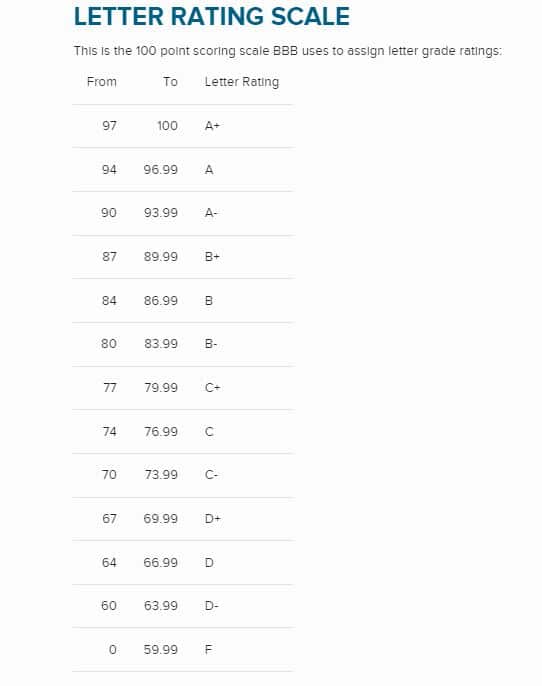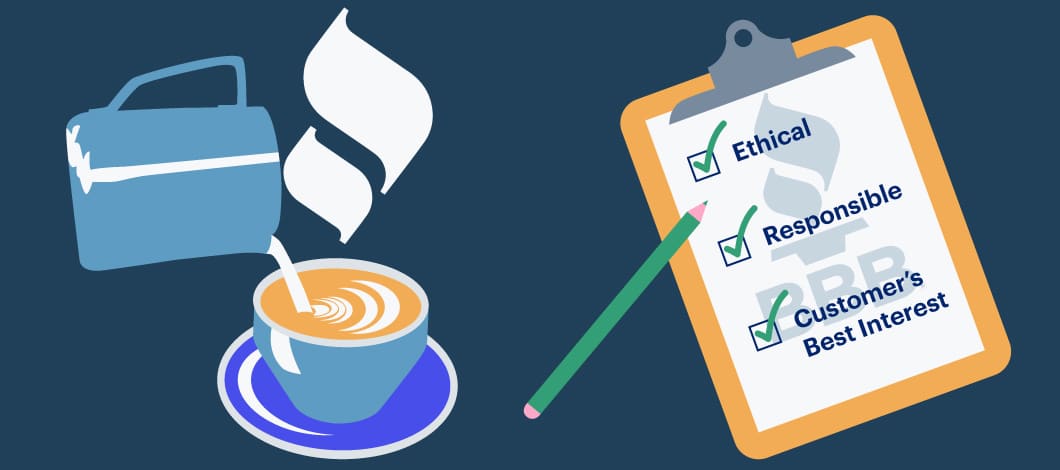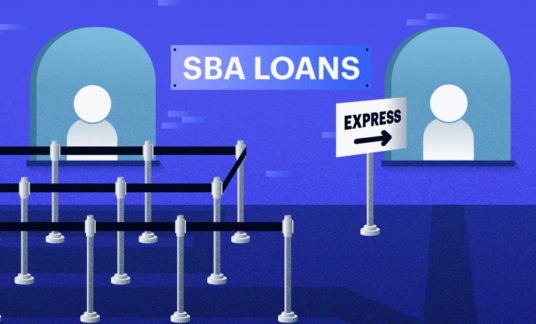As a small business owner, you’re looking for any advantage to build your customer base.
Can a BBB accreditation help with that? It depends. According to an informal poll by Housecall Pro, some responses indicated BBB membership and accreditation are more meaningful to Baby Boomers and older customers rather than younger ones. That’s something to think about when you’re considering applying to become a BBB-accredited business.
Let’s go over what BBB accreditation means, how to get BBB accredited, the pros and cons of joining the organization and what happens if a business isn’t BBB accredited.
What Is BBB Accreditation?
Part of the Better Business Bureau’s mission is handing out accreditations to qualified applicants. The Better Business Bureau has many programs to protect consumers, but the flagship is its accreditation system. This initiative aims to vet businesses for potential customers before they decide to do business with them.
What the BBB tries to do with its accreditation system is take the guesswork out of vetting a business. The BBB makes sure the company in question is conducting business ethically, responsibly and with the customer’s best interests in mind.
What Is the BBB’s Role?
Founded more than a century ago, the Better Business Bureau is a nonprofit organization that acts as an intermediary between businesses and consumers. Its mission is to “be the leader in marketplace trust,” according to the BBB website.
For a fee, the Better Business Bureau gives accreditation to businesses and mediates reviews to help consumers make better decisions regarding where they spend their money.
They aim to:
- Set standards for marketplace trust
- Encourage and support best practices by engaging with and educating consumers and businesses
- Celebrate marketplace role models
- Call out and address substandard marketplace behavior
- Create a community of trustworthy businesses and charities
The BBB network consists of more than 100 offices across the U.S. that serve the businesses in their region. You can find your local office here.
One of the Better Business Bureau’s functions is acting as a mediator for complaints. When customers submit a negative review to the BBB, the office that covers the region will investigate. You, as the business, can address the complaint, whether that means proving it to be false or working with the customer to resolve an issue.
What Does It Mean to Be a BBB-Accredited Business?
BBB-accredited businesses agree to conduct themselves according to these standards:
- Build Trust: Demonstrate a proven track record (e.g., at least 6 months of active operation) with no government action taken against the company.
- Advertise Honestly: Adhere to established ethical and legal selling and advertising practices.
- Tell the Truth: Offer clear disclosures and truthfully represent services and products.
- Be Transparent: Offer clear methods for contacting the business, provide return or refund instructions to customers, notify customers of total cost of transaction prior to purchase and provide customer receipts, among others.
- Honor Promises: Meet all requirements of a customer contract.
- Be Responsive: Promptly address BBB disputes and honor resolutions made as part of a dispute.
- Safeguard Privacy: Protect customers’ data and collect personal information solely as needed.
- Embody Integrity: Conduct business with good intent and fulfill reasonable expectations.
Additionally, to maintain Better Business Bureau accreditation, businesses must maintain the organization’s B rating.
-
How Much Does It Cost to Be BBB Accredited?
According to the BBB, accredited businesses “pay a fee for accreditation review and monitoring for continued compliance and for support of BBB services to the public.” Other online sources indicate that depending on the size of your business, you could pay hundreds of dollars or more than $1,000 in fees and annual dues. Additionally, fees could vary by local BBB chapter.
BBB Rating vs. Accreditation
While BBB accreditation is a membership-based program that requires businesses to adhere to certain codes of conduct, BBB ratings are given to accredited and non-accredited businesses and are based on information the organization is able to find about the business, including the following:
- Time in business
- Type of business
- Complaint history, including unanswered and unresolved complaints
- Transparent business practices
- Failure to honor BBB commitments
- Government and licensing actions
- How likely the business is to interact with customers
- Advertising issues (e.g., accuracy, truthfulness)
- BBB trademark infringement
The BBB determines a rating from information it gathers from public data sources as well as the business itself, though it doesn’t take customer reviews into account.
BBB ratings range from A+ on the highest end to an F at the lowest. If there isn’t enough information to rate a business, the BBB may list it with the designation “No Rating” or “NR.”

Pros and Cons of BBB Accreditation for Your Small Business
Some benefits cause business owners to say getting a BBB accreditation is worth it. However, some drawbacks might mean you can’t justify the BBB accreditation cost.
Let’s break down the pros and cons of a Better Business Bureau accreditation.
| Pros | Cons |
| Can Build Consumer Trust | Requires Annual Dues |
| Potential Increase in Business Exposure | Customers May Not Check Your BBB Rating |
Pros of BBB Accreditation
Here are a couple reasons why it could be beneficial to get accredited by the BBB.
Can Build Consumer Trust
Your business’s success heavily depends on consumer trust, and that’s one of the greatest BBB benefits. After you’ve been approved, you can display the Better Business Bureau logo out front and inside of your business. This gives customers familiar with the logo instant assurance that your business has met the BBB’s rigorous standards, including that you have all necessary operating licenses and your business hasn’t committed any ethical violations.
Customers want to make sure your business is reputable, and having the BBB accreditation logo on your website — as well as having your business profile on the BBB site — can reassure a wary customer. The BBB claims more than 400,000 businesses in North America benefit from using the organization’s accreditation seal.
Another BBB benefit of accreditation? If a negative review does arise with the BBB, you have a leg up when it comes time to dispute the claim.
Can Increase Visibility
Another important benefit BBB membership and accreditation offers is a potential increase in exposure for your small business. You’ll be added to the BBB’s searchable internet database. Potential customers can directly search for your business or come across your listing when looking for local businesses in your industry.
For example, a customer looking for a contractor to repair their deck would type “deck repair” and their ZIP code on the BBB’s website, leading them to profiles of all accredited (and non-accredited if selected) businesses in their area as well as the letter grade they’ve earned.
Having a robust and favorable business profile in front of customers searching for a company like yours could give you an edge over the competition.
Cons of BBB Accreditation
On the downside, these are a couple reasons why you might opt against getting a BBB accreditation.
Requires Yearly Dues
Small business owners’ main issue with the Better Business Bureau is cost. As a nonprofit organization, they use dues paid by owners to fund their operations and pay their employees. That means spending hundreds or even thousands of dollars a year on your BBB accreditation, depending on the size of your company.
You’ll need to decide whether the benefits make membership and BBB accreditation worth it, or if the dues money should go toward growing your company.
BBB Relevance Is Decreasing
While the BBB will point to the many site visitors and transactions they claim to have influenced, many small business owners question whether enough people know to check with them or even care enough to do so.
Conducting a web search can yield several online review resources, including Google reviews, Yelp and Angie’s List, as well as news articles and social media posts to help consumers create an informed opinion of a business. With so many other options, some potential customers might not feel they need to go to the Better Business Bureau.
For some small businesses, this lack of usage makes BBB membership cost-prohibitive. Businesses with younger, more tech-savvy customers might not need to worry about putting money into a platform that may not produce results. However, if your company does have customers likely to check with the Better Business Bureau and you don’t have accreditation, the return on investment may be worth it.

How to Become BBB Accredited
Before you begin your application, make sure your business complies with the BBB’s standards of conduct previously noted.
Once you submit your accreditation application, the BBB will take the information you give them and review your case. This can take a few weeks, but you’ll receive notice of whether you were approved (e.g., via letter, email).
If you’re denied, you’ll be told why and will be given a timeframe in which you can re-apply. If your business is approved, you’ll receive physical and digital copies of the accreditation logo with your assigned letter grade. You can display them in your store and on your company’s website. Encourage your customers to leave positive reviews with the BBB to solidify your good reputation further.
If you’ve been accredited, make sure to keep up with your membership. Promptly respond to any reviews and complaints. Failure to do so could lower your rating, alienate your BBB-using customers and even have your accreditation revoked. Staying engaged also shows customers that you’re involved and concerned about their happiness. That can go a long way toward retaining customers and promoting your business.
What If a Business Isn’t BBB Accredited?
Depending on a business’s target customer demographics, it could be unfavorable to not be BBB accredited (or at least have a good rating). However, if you decide BBB accreditation isn’t worth it, your business won’t necessarily be penalized. A good BBB rating and accreditation are shorthand for solid business practices, but positive online reviews and good word-of-mouth recommendations can garner customer trust, too.











